Deck 1: An Introduction to Problem Solving
Question
Question
Question
Question
Question
Question
Question
Question
Question
Question
Question
Question
Question
Question
Question
Question
Question
Question
Question
Question
Question
Question
Question
Question
Question
Question
Question
Question
Question
Question
Question
Question
Question
Question
Question
Question
Question
Question
Question
Question
Question
Question
Question
Question
Question
Question
Question
Question
Question
Question
Question
Question
Question
Question
Question
Question
Question
Question
Question
Question
Question
Question
Question
Question
Question
Question
Question
Question
Question
Question
Question
Question
Question
Question
Question
Question
Question
Question
Question
Question

Unlock Deck
Sign up to unlock the cards in this deck!
Unlock Deck
Unlock Deck
1/85
Play
Full screen (f)
Deck 1: An Introduction to Problem Solving
1
How many different amounts of money can you pay if you use two coins including only nickels, dimes, and quarters?
A)6
B)4
C)7
D)5
A)6
B)4
C)7
D)5
A
2
Find the following sum: 4 + 10 + 16 + . . . + 112
A)1102
B)1106
C)1110
D)1094
A)1102
B)1106
C)1110
D)1094
A
3
Complete the magic (addition)square.
Use each number 10, 11, 12, 13, 14, 15, 16, 17, and 18 once.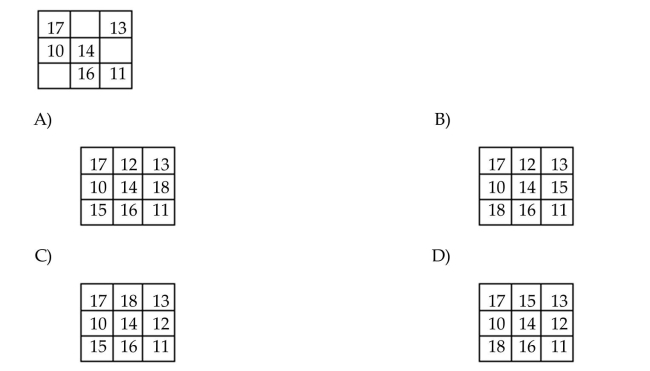
Use each number 10, 11, 12, 13, 14, 15, 16, 17, and 18 once.

A
4
How many different ways can you make change for a 25-cent coin using nickels and pennies?
A)4
B)7
C)6
D)5
A)4
B)7
C)6
D)5

Unlock Deck
Unlock for access to all 85 flashcards in this deck.
Unlock Deck
k this deck
5
How many different amounts of money can you pay if you use three coins including nickels, dimes, and quarters?
A)8
B)11
C)9
D)10
A)8
B)11
C)9
D)10

Unlock Deck
Unlock for access to all 85 flashcards in this deck.
Unlock Deck
k this deck
6
Complete the magic (addition)square.
Use each number 24, 25, 26, 27, 28, 29, 30, 31, and 32 once.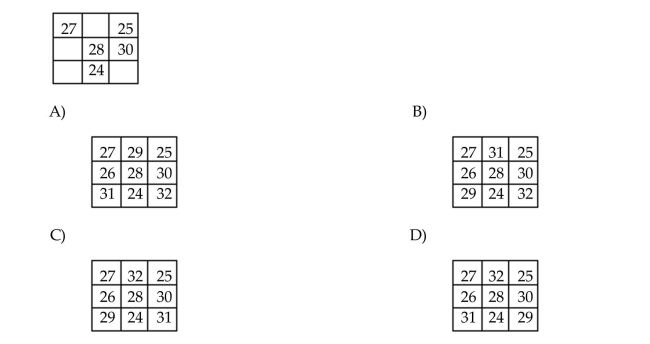
Use each number 24, 25, 26, 27, 28, 29, 30, 31, and 32 once.


Unlock Deck
Unlock for access to all 85 flashcards in this deck.
Unlock Deck
k this deck
7
How many different amounts of money can you pay if you use five coins including quarters and dimes?
A)4
B)6
C)7
D)5
A)4
B)6
C)7
D)5

Unlock Deck
Unlock for access to all 85 flashcards in this deck.
Unlock Deck
k this deck
8
How many different ways can you make change for 75 cents using quarters, dimes, and nickels?
A)18
B)15
C)16
D)17
A)18
B)15
C)16
D)17

Unlock Deck
Unlock for access to all 85 flashcards in this deck.
Unlock Deck
k this deck
9
Complete the magic (addition)square.
Use each number 37, 38, 39, 40, 41, 42, 43, 44, and 45 once.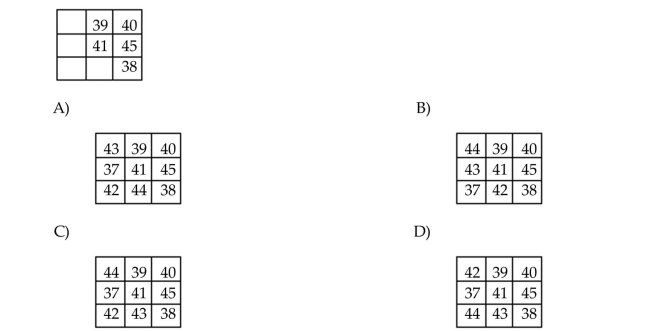
Use each number 37, 38, 39, 40, 41, 42, 43, 44, and 45 once.


Unlock Deck
Unlock for access to all 85 flashcards in this deck.
Unlock Deck
k this deck
10
Which is greater, E or P, and by how much? 


Unlock Deck
Unlock for access to all 85 flashcards in this deck.
Unlock Deck
k this deck
11
Complete the magic (addition)square.
Use each number 16, 17, 18, 19, 20, 21, 22, 23, and 24 once.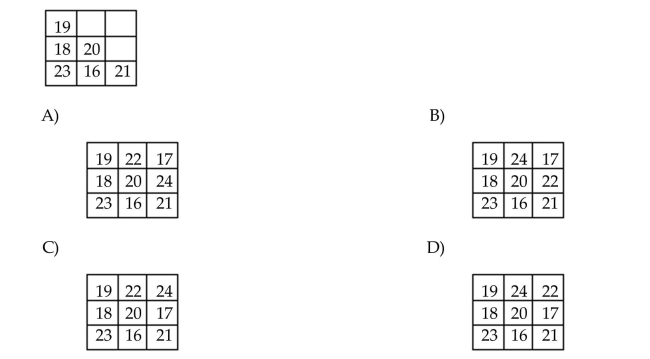
Use each number 16, 17, 18, 19, 20, 21, 22, 23, and 24 once.


Unlock Deck
Unlock for access to all 85 flashcards in this deck.
Unlock Deck
k this deck
12
Find the following sum: 6 + 20 + 34 + . . . + 986
A)35,204
B)35,216
C)35,222
D)35,228
A)35,204
B)35,216
C)35,222
D)35,228

Unlock Deck
Unlock for access to all 85 flashcards in this deck.
Unlock Deck
k this deck
13
Find the following sum: 19 + 27 + 35 + . . . + 195
A)2423
B)2461
C)2266
D)2480
A)2423
B)2461
C)2266
D)2480

Unlock Deck
Unlock for access to all 85 flashcards in this deck.
Unlock Deck
k this deck
14
Find the following sum: 5 + 405 + 805 + . . . + 4005
A)22,050
B)22,055
C)18,045
D)22,060
A)22,050
B)22,055
C)18,045
D)22,060

Unlock Deck
Unlock for access to all 85 flashcards in this deck.
Unlock Deck
k this deck
15
How many different ways can you make change for a 50-cent coin using nickels and dimes?
A)4
B)5
C)7
D)6
A)4
B)5
C)7
D)6

Unlock Deck
Unlock for access to all 85 flashcards in this deck.
Unlock Deck
k this deck
16
How many different amounts of money can you pay if you use four coins including quarters, nickels, and dimes?
A)14
B)13
C)12
D)15
A)14
B)13
C)12
D)15

Unlock Deck
Unlock for access to all 85 flashcards in this deck.
Unlock Deck
k this deck
17
How many different ways can you make change for a 25-cent coin using dimes, nickels, and pennies?
A)11
B)12
C)10
D)13
A)11
B)12
C)10
D)13

Unlock Deck
Unlock for access to all 85 flashcards in this deck.
Unlock Deck
k this deck
18
Find the following sum: 5 + 7 + 9 + . . . + 103
A)2710
B)2705
C)2700
D)2690
A)2710
B)2705
C)2700
D)2690

Unlock Deck
Unlock for access to all 85 flashcards in this deck.
Unlock Deck
k this deck
19
How many different amounts of money can you pay if you use four coins including dimes and quarters?
A)4
B)3
C)5
D)6
A)4
B)3
C)5
D)6

Unlock Deck
Unlock for access to all 85 flashcards in this deck.
Unlock Deck
k this deck
20
How many different ways can you make change for a 50-cent coin using quarters, dimes, and nickels?
A)11
B)10
C)9
D)8
A)11
B)10
C)9
D)8

Unlock Deck
Unlock for access to all 85 flashcards in this deck.
Unlock Deck
k this deck
21
Provide an appropriate response.
Look for a pattern in the sequence of figures shown below, and use your reasoning to draw the next figure.
Look for a pattern in the sequence of figures shown below, and use your reasoning to draw the next figure.


Unlock Deck
Unlock for access to all 85 flashcards in this deck.
Unlock Deck
k this deck
22
Determine how many of the indicated shape there are in the figure.
Cubes (of any size)
Cubes (of any size)


Unlock Deck
Unlock for access to all 85 flashcards in this deck.
Unlock Deck
k this deck
23
Complete the magic (addition)square.
Use each number 26, 27, 28, 29, 30, 31, 32, 33, and 34 once.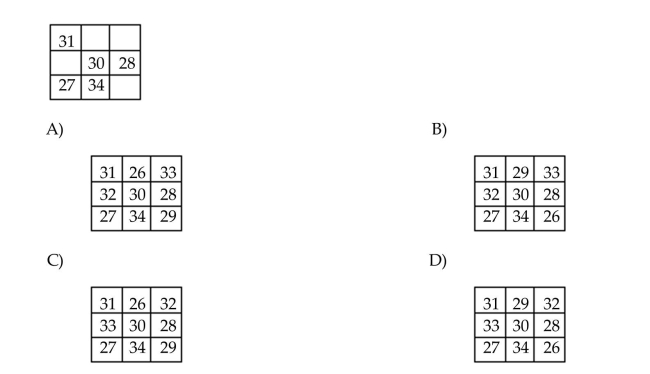
Use each number 26, 27, 28, 29, 30, 31, 32, 33, and 34 once.


Unlock Deck
Unlock for access to all 85 flashcards in this deck.
Unlock Deck
k this deck
24
A pencil box and a notebook together cost $6.28. The notebook costs $0.50 more than the pencil box. How much does the notebook cost?
A)$2.39
B)$3.39
C)$3.89
D)$2.89
A)$2.39
B)$3.39
C)$3.89
D)$2.89

Unlock Deck
Unlock for access to all 85 flashcards in this deck.
Unlock Deck
k this deck
25
Find the requested term in the sequence.
The next term in 8, 32, 96, 288, 864, . . .
A)7776
B)23,328
C)2592
D)69,984
The next term in 8, 32, 96, 288, 864, . . .
A)7776
B)23,328
C)2592
D)69,984

Unlock Deck
Unlock for access to all 85 flashcards in this deck.
Unlock Deck
k this deck
26
Determine how many of the indicated shape there are in the figure.
Squares (of any size)
Squares (of any size)


Unlock Deck
Unlock for access to all 85 flashcards in this deck.
Unlock Deck
k this deck
27
Provide an appropriate response.
Look for a pattern in the sequence of figures shown below, and use your reasoning to draw the next figure.
Look for a pattern in the sequence of figures shown below, and use your reasoning to draw the next figure.


Unlock Deck
Unlock for access to all 85 flashcards in this deck.
Unlock Deck
k this deck
28
Provide an appropriate response.
Look for a pattern in the sequence of figures shown below, and use your reasoning to draw the next figure.
Look for a pattern in the sequence of figures shown below, and use your reasoning to draw the next figure.


Unlock Deck
Unlock for access to all 85 flashcards in this deck.
Unlock Deck
k this deck
29
Alamo, Brushy, Chet, and Dolly are in an armadillo race. Chet is the slowest. Dolly is faster than Alamo, but slower than Brushy. Name the finishing order of the armadillos.
A)Brushy, Alamo, Dolly, Chet
B)Alamo, Dolly, Brushy, Chet
C)Alamo, Brushy, Dolly, Chet
D)Brushy, Dolly, Alamo, Chet
A)Brushy, Alamo, Dolly, Chet
B)Alamo, Dolly, Brushy, Chet
C)Alamo, Brushy, Dolly, Chet
D)Brushy, Dolly, Alamo, Chet

Unlock Deck
Unlock for access to all 85 flashcards in this deck.
Unlock Deck
k this deck
30
Determine how many of the indicated shape there are in the figure.



Unlock Deck
Unlock for access to all 85 flashcards in this deck.
Unlock Deck
k this deck
31
Determine how many of the indicated shape there are in the figure.
Triangles (of any size)
Triangles (of any size)


Unlock Deck
Unlock for access to all 85 flashcards in this deck.
Unlock Deck
k this deck
32
Provide an appropriate response.
Use a traditional clock face to determine the next three terms in the following sequence: 1, 11, 9, 7, 5, . . .
A)3, 1, 11
B)3, 3, 10
C)2, 2, 11
D)4, 2, 12
Use a traditional clock face to determine the next three terms in the following sequence: 1, 11, 9, 7, 5, . . .
A)3, 1, 11
B)3, 3, 10
C)2, 2, 11
D)4, 2, 12

Unlock Deck
Unlock for access to all 85 flashcards in this deck.
Unlock Deck
k this deck
33
Complete the magic (addition)square.
Use each number 47, 48, 49, 50, 51, 52, 53, 54, and 55 once.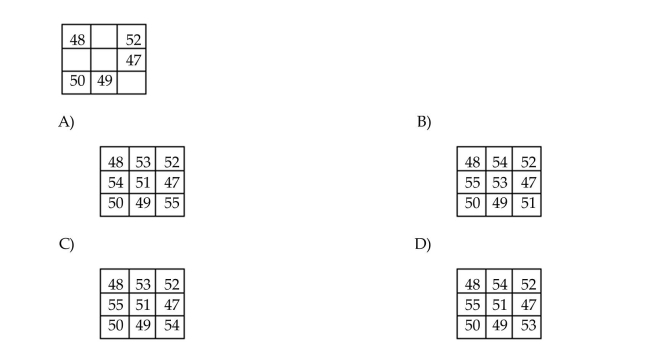
Use each number 47, 48, 49, 50, 51, 52, 53, 54, and 55 once.


Unlock Deck
Unlock for access to all 85 flashcards in this deck.
Unlock Deck
k this deck
34
Find the first five terms in the sequence whose nth term is given.

A)2, 8, 18, 32, 50
B)3, 6, 11, 14, 22
C)3, 6, 11, 18, 27
D)4, 6, 8, 10, 12

A)2, 8, 18, 32, 50
B)3, 6, 11, 14, 22
C)3, 6, 11, 18, 27
D)4, 6, 8, 10, 12

Unlock Deck
Unlock for access to all 85 flashcards in this deck.
Unlock Deck
k this deck
35
Provide an appropriate response.
Look for a pattern in the sequence of figures shown below, and use your reasoning to draw the next figure.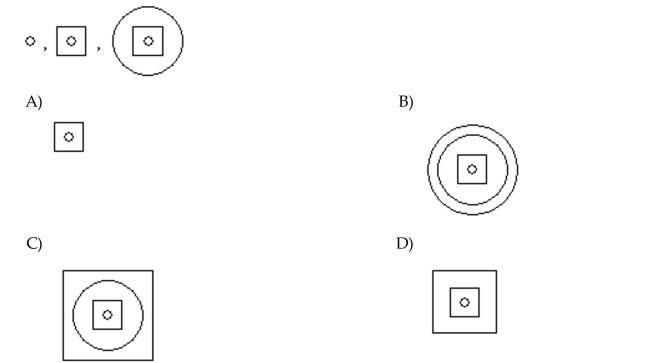
Look for a pattern in the sequence of figures shown below, and use your reasoning to draw the next figure.


Unlock Deck
Unlock for access to all 85 flashcards in this deck.
Unlock Deck
k this deck
36
Find the requested term in the sequence.



Unlock Deck
Unlock for access to all 85 flashcards in this deck.
Unlock Deck
k this deck
37
The temperature rose 7 degrees from 10:00 A.M. to noon. By 3:00 P.M. the temperature had doubled. From 3:00 P.M. to 6:00 P.M. the temperature rose 6 degrees to 94 degrees. What was the
Temperature at 10:00 A.M. that morning?
A)51 degrees
B)43 degrees
C)37 degrees
D)81 degrees
Temperature at 10:00 A.M. that morning?
A)51 degrees
B)43 degrees
C)37 degrees
D)81 degrees

Unlock Deck
Unlock for access to all 85 flashcards in this deck.
Unlock Deck
k this deck
38
What is the sum of three consecutive integers in terms of the middle number x? What
would the sum be in terms of the middle number for five and seven consecutive integers?
What can you generalize about the sum of n consecutive integers where n is odd?
would the sum be in terms of the middle number for five and seven consecutive integers?
What can you generalize about the sum of n consecutive integers where n is odd?

Unlock Deck
Unlock for access to all 85 flashcards in this deck.
Unlock Deck
k this deck
39


Unlock Deck
Unlock for access to all 85 flashcards in this deck.
Unlock Deck
k this deck
40
A drink and a sandwich together cost $4.75. The sandwich costs $1.25 more than the drink. How much does the sandwich cost?
A)$0.50
B)$4.25
C)$1.75
D)$3.00
A)$0.50
B)$4.25
C)$1.75
D)$3.00

Unlock Deck
Unlock for access to all 85 flashcards in this deck.
Unlock Deck
k this deck
41
Indicate whether the sequence is arithmetic, geometric, or neither. Give the next two terms in the sequence.
13, 14, 21, 28, 35, . . .
A)Geometric; 42; 49
B)Arithmetic; 42; 49
C)Neither; 42; 49
13, 14, 21, 28, 35, . . .
A)Geometric; 42; 49
B)Arithmetic; 42; 49
C)Neither; 42; 49

Unlock Deck
Unlock for access to all 85 flashcards in this deck.
Unlock Deck
k this deck
42
Indicate whether the sequence is arithmetic, geometric, or neither. Give the next two terms in the sequence.
6, 15, 18, 21, 24, . . .
A)Neither; 27; 30
B)Arithmetic; 24; 27
C)Geometric; 33; 30
6, 15, 18, 21, 24, . . .
A)Neither; 27; 30
B)Arithmetic; 24; 27
C)Geometric; 33; 30

Unlock Deck
Unlock for access to all 85 flashcards in this deck.
Unlock Deck
k this deck
43
Indicate whether the sequence is arithmetic, geometric, or neither. Give the next two terms in the sequence.
10, 35, 60, 85, 110, . . .
A)Geometric; 135; 145
B)Arithmetic; 135; 160
C)Neither; 135; 160
10, 35, 60, 85, 110, . . .
A)Geometric; 135; 145
B)Arithmetic; 135; 160
C)Neither; 135; 160

Unlock Deck
Unlock for access to all 85 flashcards in this deck.
Unlock Deck
k this deck
44
Provide an appropriate response.
Look for a pattern in the sequence of figures shown below. How many triangles are needed for the 4th figure? The nth figure?
Look for a pattern in the sequence of figures shown below. How many triangles are needed for the 4th figure? The nth figure?


Unlock Deck
Unlock for access to all 85 flashcards in this deck.
Unlock Deck
k this deck
45
Indicate whether the sequence is arithmetic, geometric, or neither. Give the next two terms in the sequence.
1, 10, 11, 21, 32, . . .
A)Geometric; 53; 85
B)Neither; 53; 85
C)Arithmetic; 53; 85
1, 10, 11, 21, 32, . . .
A)Geometric; 53; 85
B)Neither; 53; 85
C)Arithmetic; 53; 85

Unlock Deck
Unlock for access to all 85 flashcards in this deck.
Unlock Deck
k this deck
46
Find the requested term in the sequence.
The 10th term in 20, 20.2, 20.4, 20.8, 20.16, . . .
A)20.256
B)512
C)20.512
D)20.1024
The 10th term in 20, 20.2, 20.4, 20.8, 20.16, . . .
A)20.256
B)512
C)20.512
D)20.1024

Unlock Deck
Unlock for access to all 85 flashcards in this deck.
Unlock Deck
k this deck
47
Find the requested term in the sequence.
The 100th term in 8, 13, 18, 23, 28, . . .
A)498
B)504
C)503
D)508
The 100th term in 8, 13, 18, 23, 28, . . .
A)498
B)504
C)503
D)508

Unlock Deck
Unlock for access to all 85 flashcards in this deck.
Unlock Deck
k this deck
48
Provide an appropriate response.
Look for a pattern in the sequence of figures shown below. How many squares are needed for the 4th figure? The nth figure?
Look for a pattern in the sequence of figures shown below. How many squares are needed for the 4th figure? The nth figure?


Unlock Deck
Unlock for access to all 85 flashcards in this deck.
Unlock Deck
k this deck
49
Indicate whether the sequence is arithmetic, geometric, or neither. Give the next two terms in the sequence.
15, 75, 375, 1875, 9375, . . .
A)Geometric; 46,875; 234,375
B)Neither; 93,750; 468,750
C)Arithmetic; 468,750; 703,125
15, 75, 375, 1875, 9375, . . .
A)Geometric; 46,875; 234,375
B)Neither; 93,750; 468,750
C)Arithmetic; 468,750; 703,125

Unlock Deck
Unlock for access to all 85 flashcards in this deck.
Unlock Deck
k this deck
50
Indicate whether the sequence is arithmetic, geometric, or neither. Give the next two terms in the sequence.
2, 30, 300, 3000, 30,000, . . .
A)Arithmetic; 300,000; 3,000,000
B)Geometric; 300,000; 3,000,000
C)Neither; 300,000; 3,000,000
2, 30, 300, 3000, 30,000, . . .
A)Arithmetic; 300,000; 3,000,000
B)Geometric; 300,000; 3,000,000
C)Neither; 300,000; 3,000,000

Unlock Deck
Unlock for access to all 85 flashcards in this deck.
Unlock Deck
k this deck
51
Find the first five terms in the sequence whose nth term is given.

A)20, 40, 60, 80, 100
B)9, 14, 19, 24, 29
C)9, 13, 17, 21, 25
D)9, 18, 27, 36, 45

A)20, 40, 60, 80, 100
B)9, 14, 19, 24, 29
C)9, 13, 17, 21, 25
D)9, 18, 27, 36, 45

Unlock Deck
Unlock for access to all 85 flashcards in this deck.
Unlock Deck
k this deck
52
Find the requested term in the sequence.



Unlock Deck
Unlock for access to all 85 flashcards in this deck.
Unlock Deck
k this deck
53
Indicate whether the sequence is arithmetic, geometric, or neither. Give the next two terms in the sequence.
1, 8, 15, 22, 29, . . .
A)Geometric; 36; 44
B)Neither; 37; 44
C)Arithmetic; 36; 43
1, 8, 15, 22, 29, . . .
A)Geometric; 36; 44
B)Neither; 37; 44
C)Arithmetic; 36; 43

Unlock Deck
Unlock for access to all 85 flashcards in this deck.
Unlock Deck
k this deck
54
Indicate whether the sequence is arithmetic, geometric, or neither. Give the next two terms in the sequence.
4, 12, 120, 1200, 12,000, . . .
A)Arithmetic; 120,000; 1,200,000
B)Neither; 120,000; 1,200,000
C)Geometric; 120,000; 1,200,000
4, 12, 120, 1200, 12,000, . . .
A)Arithmetic; 120,000; 1,200,000
B)Neither; 120,000; 1,200,000
C)Geometric; 120,000; 1,200,000

Unlock Deck
Unlock for access to all 85 flashcards in this deck.
Unlock Deck
k this deck
55
Find the requested term in the sequence.
The nth term in 15, 30, 45, 60, 75, . . .
A)15n + 2
B)15n
C)15n + 15
D)15n - 15
The nth term in 15, 30, 45, 60, 75, . . .
A)15n + 2
B)15n
C)15n + 15
D)15n - 15

Unlock Deck
Unlock for access to all 85 flashcards in this deck.
Unlock Deck
k this deck
56
Find the requested term in the sequence.
The 10th term in 13, 19, 20, 21, 22, . . .
A)27
B)29
C)28
D)26
The 10th term in 13, 19, 20, 21, 22, . . .
A)27
B)29
C)28
D)26

Unlock Deck
Unlock for access to all 85 flashcards in this deck.
Unlock Deck
k this deck
57
Provide an appropriate response.
Following is a sequence of black balls and white balls. How many black balls are needed for the 100th term?
Following is a sequence of black balls and white balls. How many black balls are needed for the 100th term?


Unlock Deck
Unlock for access to all 85 flashcards in this deck.
Unlock Deck
k this deck
58
Find the requested term in the sequence.
The 100th term in 6, 8, 17, 26, 35, . . .
A)899
B)881
C)908
D)890
The 100th term in 6, 8, 17, 26, 35, . . .
A)899
B)881
C)908
D)890

Unlock Deck
Unlock for access to all 85 flashcards in this deck.
Unlock Deck
k this deck
59
Indicate whether the sequence is arithmetic, geometric, or neither. Give the next two terms in the sequence.
5, 15, 45, 135, 405, . . .
A)Neither; 411; 415
B)Geometric; 1215; 3645
C)Arithmetic; 408; 414
5, 15, 45, 135, 405, . . .
A)Neither; 411; 415
B)Geometric; 1215; 3645
C)Arithmetic; 408; 414

Unlock Deck
Unlock for access to all 85 flashcards in this deck.
Unlock Deck
k this deck
60
Find the first five terms in the sequence whose nth term is given.



Unlock Deck
Unlock for access to all 85 flashcards in this deck.
Unlock Deck
k this deck
61
 Find the number of terms in the sequence or the sum of the sequence as requested.
Find the number of terms in the sequence or the sum of the sequence as requested.Find the sum of the following arithmetic sequence. 1 + 2 + 3 + . . . + 500
A)125,000
B)251,001
C)62,500
D)125,250

Unlock Deck
Unlock for access to all 85 flashcards in this deck.
Unlock Deck
k this deck
62
Which terms, n and m, in the arithmetic sequence 175, 250, 325, . . . and the geometric
sequence 1, 10, 100, . . ., respectively, have the same value? What is the value?
sequence 1, 10, 100, . . ., respectively, have the same value? What is the value?

Unlock Deck
Unlock for access to all 85 flashcards in this deck.
Unlock Deck
k this deck
63
 Find the number of terms in the sequence or the sum of the sequence as requested.
Find the number of terms in the sequence or the sum of the sequence as requested.The first difference of a sequence is 2, 4, 6, 8, 10, . . . Find the first six terms of the original sequence if the first term in the original sequence is 8.
A)10, 14, 20, 28, 38, 50
B)8, 10, 14, 20, 28, 38
C)8, 16, 32, 48, 64, 80
D)8, 10, 12, 14, 16, 18

Unlock Deck
Unlock for access to all 85 flashcards in this deck.
Unlock Deck
k this deck
64
Provide an appropriate response.
The following sequence is made of black circles. How many circles are needed for the 10th figure? The 15th figure?
The following sequence is made of black circles. How many circles are needed for the 10th figure? The 15th figure?


Unlock Deck
Unlock for access to all 85 flashcards in this deck.
Unlock Deck
k this deck
65
The population of a town was 33,100 at the beginning of 1970. If the population decreased 300 people per year, how many people lived in the town at the beginning of 1985?
A)4500
B)28,900
C)28,300
D)28,600
A)4500
B)28,900
C)28,300
D)28,600

Unlock Deck
Unlock for access to all 85 flashcards in this deck.
Unlock Deck
k this deck
66
Find the number of terms in the sequence or the sum of the sequence as requested.
Find the number of terms in the following arithmetic sequence. 3, 9, 15, 21, . . ., 129
A)16
B)22
C)25
D)19
Find the number of terms in the following arithmetic sequence. 3, 9, 15, 21, . . ., 129
A)16
B)22
C)25
D)19

Unlock Deck
Unlock for access to all 85 flashcards in this deck.
Unlock Deck
k this deck
67
Provide an appropriate response.
In the following sequence, the figures are made of cubes that are glued together. If the exposed surface is to be painted, then how many squares will be painted in the 10th figure?
In the following sequence, the figures are made of cubes that are glued together. If the exposed surface is to be painted, then how many squares will be painted in the 10th figure?


Unlock Deck
Unlock for access to all 85 flashcards in this deck.
Unlock Deck
k this deck
68
 Find the number of terms in the sequence or the sum of the sequence as requested.
Find the number of terms in the sequence or the sum of the sequence as requested.The first difference of a sequence is 3, 6, 9, 12, 15, . . . Find the first six terms of the original sequence if the sum of the first two terms is 17.
A)7, 10, 16, 25, 37, 52
B)17, 20, 26, 35, 47, 62
C)17, 20, 23, 26, 29, 32
D)7, 10, 13, 16, 19, 22

Unlock Deck
Unlock for access to all 85 flashcards in this deck.
Unlock Deck
k this deck
69
Find the number of terms in the sequence or the sum of the sequence as requested.
Find the number of terms in the following arithmetic sequence. 8, 11, 14, 17, . . ., 89
A)28
B)30
C)81
D)84
Find the number of terms in the following arithmetic sequence. 8, 11, 14, 17, . . ., 89
A)28
B)30
C)81
D)84

Unlock Deck
Unlock for access to all 85 flashcards in this deck.
Unlock Deck
k this deck
70
If a person puts 1¢ in a piggy bank on the first day, 2¢ on the second day, 3¢ on the third day, and so forth, how much money will be in the bank after 30 days?
A)$ 9.30
B)$ 2.33
C)$ 4.65
D)$ 0.30
A)$ 9.30
B)$ 2.33
C)$ 4.65
D)$ 0.30

Unlock Deck
Unlock for access to all 85 flashcards in this deck.
Unlock Deck
k this deck
71
 Find the number of terms in the sequence or the sum of the sequence as requested.
Find the number of terms in the sequence or the sum of the sequence as requested.Find the sum of the following arithmetic sequence. 11 + 13 + . . . + 601
A)89,975
B)90,601
C)90,576
D)76,176

Unlock Deck
Unlock for access to all 85 flashcards in this deck.
Unlock Deck
k this deck
72
 Find the number of terms in the sequence or the sum of the sequence as requested.
Find the number of terms in the sequence or the sum of the sequence as requested.The first difference of a sequence is 2, 4, 6, 8, 10, . . . Find the first six terms of the original sequence if the third term of the original sequence is 61.
A)61, 63, 65, 67, 69, 71
B)55, 57, 61, 67, 69, 71
C)59, 57, 61, 67, 69, 71
D)55, 57, 61, 67, 75, 85

Unlock Deck
Unlock for access to all 85 flashcards in this deck.
Unlock Deck
k this deck
73
A man earned $ 3000 the first year he worked. If he received a raise of $400 at the end of each year, what was his salary during the 15 th year?
A)$ 9000
B)None of these
C)$ 8600
D)$ 5600
A)$ 9000
B)None of these
C)$ 8600
D)$ 5600

Unlock Deck
Unlock for access to all 85 flashcards in this deck.
Unlock Deck
k this deck
74
At what term will the geometric sequence 1, 2, 4, 8, . . . become greater than the arithmetic
sequence 0, 20, 40, 60, . . .?
sequence 0, 20, 40, 60, . . .?

Unlock Deck
Unlock for access to all 85 flashcards in this deck.
Unlock Deck
k this deck
75
Find the number of terms in the sequence or the sum of the sequence as requested.
Find the number of terms in the following arithmetic sequence. 1, 3, 5, 7, . . ., 51
A)28
B)26
C)25
D)51
Find the number of terms in the following arithmetic sequence. 1, 3, 5, 7, . . ., 51
A)28
B)26
C)25
D)51

Unlock Deck
Unlock for access to all 85 flashcards in this deck.
Unlock Deck
k this deck
76
A collection of dimes is arranged in a triangular array with 11 coins in the base row, 10 in the next, 9 in the next, and so forth. Find the value of the collection.
A)$ 0.66
B)$ 13.20
C)$ 3.30
D)$ 6.60
A)$ 0.66
B)$ 13.20
C)$ 3.30
D)$ 6.60

Unlock Deck
Unlock for access to all 85 flashcards in this deck.
Unlock Deck
k this deck
77
A rose garden has 16 bushes in one row, 13 bushes in the next row, then 10 , and so on. If there are 51 bushes in the garden, in how many rows are they planted?
A)3
B)5
C)7
D)6
A)3
B)5
C)7
D)6

Unlock Deck
Unlock for access to all 85 flashcards in this deck.
Unlock Deck
k this deck
78
 Find the number of terms in the sequence or the sum of the sequence as requested.
Find the number of terms in the sequence or the sum of the sequence as requested.Find the sum of the following arithmetic sequence. 10 + 11 + 12 + . . . + 500
A)125,205
B)124,714
C)125,250
D)125,214

Unlock Deck
Unlock for access to all 85 flashcards in this deck.
Unlock Deck
k this deck
79
An auditorium has 15 rows with 10 seats in the first row, 12 in the second row, 14 in the third row, and so forth. How many seats are in the auditorium?
A)390
B)300
C)255
D)360
A)390
B)300
C)255
D)360

Unlock Deck
Unlock for access to all 85 flashcards in this deck.
Unlock Deck
k this deck
80
 Find the number of terms in the sequence or the sum of the sequence as requested.
Find the number of terms in the sequence or the sum of the sequence as requested.Find the sum of the following arithmetic sequence. 4 + 8 + 12 + . . . + 100
A)1300
B)1250
C)156.25
D)10,000

Unlock Deck
Unlock for access to all 85 flashcards in this deck.
Unlock Deck
k this deck



